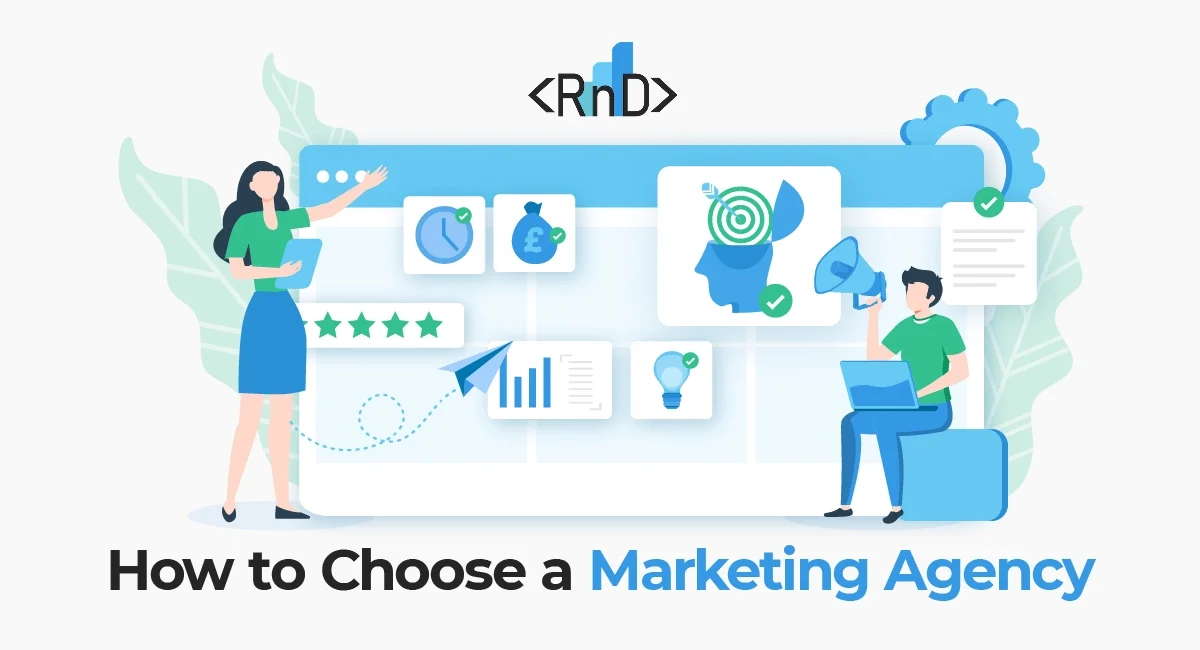Selecting the right marketing agency is an important decision that can greatly impact your business’s success. With countless options available, it’s crucial to navigate the selection process thoughtfully. In this step-by-step guide, we’ll walk you through the essential considerations to help you choose a marketing agency that aligns with your goals and drives your business forward.
Why Choose a Marketing Agency?
Choosing a marketing agency can be a strategic move for businesses looking to thrive in today’s competitive landscape. Marketing agencies bring a wealth of expertise, resources, and industry insights to the table. They provide a dedicated team of professionals who specialize in various facets of marketing, from digital strategies to creative content and data analysis. By partnering with a marketing agency, businesses gain access to a broader skill set and a fresh perspective on their marketing efforts.
Additionally, agencies stay up-to-date with the latest marketing trends and technologies, ensuring that their clients remain ahead of the curve. This collaboration allows businesses to focus on their core operations while leaving the intricacies of marketing in the hands of seasoned experts, ultimately driving growth, brand visibility, and customer engagement.
The Main Types of Marketing Agencies
- Advertising Agencies: These agencies focus primarily on creating and executing advertising campaigns across various media channels, including television, radio, print, digital, and social media. They often provide services such as creative development, media planning and buying, and campaign analysis.
- Digital Marketing Agencies: Specializing in online marketing, these agencies cover a broad range of digital channels, including SEO (Search Engine Optimization), PPC (Pay-Per-Click) advertising, content marketing, email marketing, social media marketing, and web design and development.
- Content Marketing Agencies: Content marketing agencies are dedicated to creating high-quality content that engages and educates the target audience. They produce blog posts, articles, videos, infographics, and other content formats to drive brand awareness and lead generation.
- Social Media Marketing Agencies: Focusing exclusively on social media platforms, these agencies help businesses develop and implement effective social media strategies. They manage social media accounts, create content, run ad campaigns, and analyze social media performance.
- SEO Agencies: SEO agencies are experts in improving a website’s visibility in search engine results. They optimize websites, conduct keyword research, and implement strategies to increase organic traffic and rankings.
- Email Marketing Agencies: Specializing in email marketing, these agencies design and execute email campaigns to reach and engage a target audience effectively. They often integrate email marketing with other digital marketing efforts.
- Creative Agencies: Creative agencies focus on developing compelling and visually appealing creative assets, including branding, graphic design, video production, and advertising campaigns. They often collaborate with other marketing agencies to execute their creative concepts.
- Media Buying Agencies: These agencies specialize in purchasing advertising space or time on behalf of their clients. They negotiate with media outlets to secure the best placements and pricing for ads.
- Specialized Niche Agencies: Some agencies specialize in niche areas such as healthcare marketing, automotive marketing, financial services marketing, or technology marketing. They have industry-specific expertise and insights.
- Affiliate marketing agencies: Another important channel of marketing is affiliate marketing. Some agencies specialize in affiliate management consulting, optimization and building an affiliate marketing program from the ground up.
How do marketing agencies price their services?
Marketing agencies use different ways to price their services. It depends on what exactly you need from them and in what capacity. Having said that, here are the most common practices for pricing that marketing agencies use:
- Hourly Rate: In this model, the agency charges clients based on the number of hours worked by their team members on a project. Each team member may have a different hourly rate, depending on their expertise. Hourly rates are often used for tasks like consulting, graphic design, and copywriting.
- Project-Based: For specific projects with well-defined scopes, agencies may provide a fixed project-based fee. This fee covers all the services required to complete the project, from planning and execution to delivery. It offers cost predictability for clients.
- Retainer: A retainer agreement involves the client paying a recurring monthly fee to the agency for ongoing services. Retainers are common for services like social media management, content creation, or ongoing SEO efforts. It ensures a dedicated level of service each month.
- Commission-Based: Some agencies, especially in advertising and media buying, earn a commission based on the advertising spend they manage for the client. The agency’s fee is a percentage of the total media spend.
- Performance-Based: In a performance-based pricing model, the agency’s compensation is tied to the results they achieve for the client. Common performance metrics include lead generation, conversions, sales, or other key performance indicators (KPIs).
- Markup: Agencies may charge a markup on certain expenses, such as media buying, printing, or software licences. This markup covers the agency’s management and coordination of these services.
- Value-Based: Value-based pricing takes into account the perceived value of the services provided and the potential impact on the client’s business. Agencies work closely with clients to determine the value they expect to receive and price their services accordingly.
- Hybrid or Custom Pricing: Some agencies combine multiple pricing models to tailor their pricing to the specific needs of each client. This approach allows flexibility in accommodating diverse projects and client requirements.
Step-By-Step Guide to Choosing a Marketing Agency
Now that we covered the basics of why you need a marketing agency, their value and pricing, let’s go over the steps you need to take when choosing a marketing agency to suit your needs.
1: Understand What Marketing Agencies Do
Before diving into your search, it’s vital to have a clear understanding of what marketing agencies offer. Marketing agencies are professional firms or teams specializing in various marketing services to help businesses promote their products or services effectively. These services can encompass a wide range of areas, such as digital marketing, social media management, content creation, affiliate marketing services, search engine optimization consultancy (SEO), pay-per-click (PPC) advertising, and more.
2: Define Your Goals
Defining your goals serves as the compass guiding your marketing journey. It’s not just about setting objectives but also outlining the path to your desired destination. By articulating your intentions clearly—whether it’s to expand your brand’s reach, drive targeted traffic, secure new leads, or optimize conversion rates—you empower yourself to seek an agency that possesses the expertise and strategies tailored to fulfill those specific objectives.
In essence, your well-defined goals lay the foundation for a successful partnership with a marketing agency that can turn your vision into measurable results.
3: Decide Which Marketing Services You Need
Deciding which marketing services you need is a crucial step in tailoring your marketing strategy to meet your unique objectives. For instance, if you aim to build brand awareness and engage with your audience, social media management and content marketing might be top priorities. On the other hand, if you’re looking for immediate leads or conversions, pay-per-click advertising could take precedence.
By precisely identifying your requirements, you not only streamline your search for the right agency but also pave the way for a customized marketing approach that aligns seamlessly with your goals and maximizes your return on investment (ROI).
4: Set a Budget
Setting a budget is a fundamental step in your journey to choosing the right marketing agency. It’s the financial bedrock upon which your entire marketing strategy is built. But why is this step so paramount?
First and foremost, your budget serves as a realistic gauge of your financial capabilities. It gives you a clear picture of what you can afford to invest in your marketing efforts. It’s essential to strike a balance here: you want to allocate enough resources to achieve your goals, but you also need to be mindful of not overextending your finances.
However, it’s not just about what you can spend; it’s about what you expect to gain in return. Your budget should align with the potential return on investment (ROI). Quality marketing often requires a reasonable investment, and understanding this can prevent underinvestment, which may lead to lackluster results.
5: Research and narrow Your List of Marketing Agencies
When researching and narrowing down your list of marketing agencies, thorough due diligence is your best ally. Dig deep into their online presence, explore their previous work, and seek testimonials from their clients to gain insights into their capabilities and track record. By meticulously evaluating their industry experience and past achievements, you can confidently select an agency that not only meets your needs but also possesses a proven history of delivering exceptional results in the marketing landscape.
6: Request a Detailed Service Agreement Before Hiring a Marketing Company
Requesting a comprehensive service agreement is akin to setting the rules of engagement for your marketing collaboration. It serves as a safeguard against potential conflicts and misunderstandings by clearly delineating the responsibilities, expectations, and contractual terms. By fostering transparency and alignment through this agreement, you establish a solid foundation for a successful and harmonious partnership with your chosen marketing agency.
7: Consider Online Customer Reviews About Potential Marketing Companies
Delving into online customer reviews is akin to tapping into the collective wisdom of past clients. It offers a real-world perspective on the agency’s performance, reputation, and overall client satisfaction. Scrutinizing these reviews across various platforms empowers you to identify trends, gauge client experiences, and assess how the agency handles feedback, ultimately aiding your decision-making process in selecting a marketing partner who not only delivers results but also values strong client relationships.
8: Review the Marketing Company’s Marketing
Evaluating the marketing agency’s own marketing initiatives is akin to examining their prowess in action. A strong online presence, an informative website, and active social media profiles serve as tangible proof of their ability to navigate the digital landscape effectively. An agency that invests in its own marketing endeavors showcases a commitment to staying at the forefront of industry trends, a trait that bodes well for its capability to elevate your brand in the digital realm.
9: Ask for Work Samples from Marketing
Requesting work samples or case studies from a marketing agency provides you with concrete evidence of their capabilities and results. It allows you to dive deep into their creative solutions, strategic acumen, and the impact they’ve had on clients in similar industries or niches. These real-world examples serve as a litmus test, offering valuable insights into how the agency can translate its expertise into tangible success for your specific business needs.
Final Thoughts
In conclusion, selecting the right marketing agency is a crucial step in achieving your business objectives. By following these steps, you’ll be well-equipped to make an informed decision that aligns with your goals and sets you on a path to marketing success. Remember that the ideal agency is not just a service provider but a true partner in your business’s growth.
Choosing wisely now can lead to a prosperous future for your business, with the right marketing agency as your trusted ally.
So it Doesn’t matter if you are looking to build your marketing department from scratch or optimize your existing one, RnD Marketing can be your one-stop-shop for all your marketing needs.
Frequently Asked Questions
Marketing agencies bring a wealth of expertise, resources, and industry insights to the table. They provide a dedicated team of professionals who specialize in various facets of marketing.
Marketing agencies are professional firms or teams specializing in various marketing services to help businesses promote their products or services effectively.
The more specific and measurable your goals, the better equipped you’ll be to choose an agency that can deliver results aligned with your vision.
Yes. Setting a budget is a fundamental step in your journey to choosing the right marketing agency. It’s the financial bedrock upon which your entire marketing strategy is built.
Of course. Marketing agencies will be happy to provide samples of their work in order to convince you to choose them.





